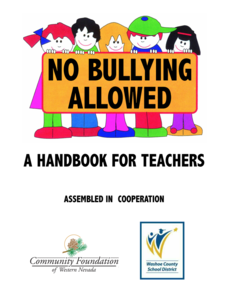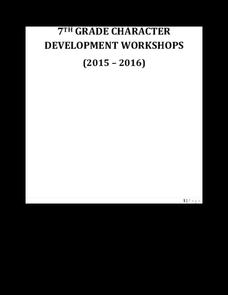Missouri Department of Elementary
“Re-Solutioning”: Practice Brings Out Our Best
Seventh graders create and perform a skit that demonstrates their conflict resolution skills. They begin by examining the process of crafting a performance and review what they have learned about conflict resolution. Next, they...
Missouri Department of Elementary
My Problem…Your Problem…Our Problem
Encourage sixth graders to take responsibility for their actions and become a problem solver. Pupils discuss new problems faced in sixth grade then identify ones that involve other people. A worksheet guides their practice in conflict...
Nemours KidsHealth
Empathy: Grades 6-8
Middle schoolers develop an understanding of what empathy is and learn what they can do to show compassion to others with the help of articles and activities in a four-page packet. Learners develop PSAs to post around the school, engage...
Nemours KidsHealth
Conflict Resolution: Grades 6-8
Conflicts happen, conflicts grow, it's how to handle them that middle schoolers need to know. Introduce tweens to a problem-solving approach for handling anger with a series of activities that has class members read articles, research...
Missouri Department of Elementary
Put Yourself in Check
The final lesson in a four-part unit on conflict resolution offers middle schoolers strategies for how to keep themselves in check when involved in conflicts. A role-play activity and a reflective journal stress the importance of...
Missouri Department of Elementary
Managing Conflicts
Conflicts happen. Learning how to manage conflicts in mature and positive ways is an important part of social-emotion growth. The lesson offers insight into behaviors that exacerbate conflicts as well as suggestions for how to resolve...
Western Justice Center
Culture and Identity
To conclude a study of conflict resolution, class members watch and discuss a series of five videos that frame the conversation in terms of culture and identity, understanding bias, oppression, and interpersonal biases.
Western Justice Center
Power
A short video asks viewers to think about power in new ways. The narrator suggests that there are different types of power, 10 different sources of power. After watching the video, class members study a series of scenarios and identify...
Western Justice Center
Negotiation
When to negotiate and when not to negotiate, that is the question at the heart of this conflict resolution lesson. Class members watch a short video about negotiation tools, read an article about negotiation tips, and engage in role play...
Western Justice Center
Emotions, Regulation Strategies
To regulate emotions in a conflict it is first necessary to be able to identify those emotions. To that end, class members engage in a series of activities, watch a series of videos, and compete worksheets that help them understand and...
Western Justice Center
Underlying Needs
Conflicts arise when underlying needs are unmet. An engaging video introduces viewers to nine basic human needs. Then, through a series of videos, worksheets, and activities, class members learn that by focusing on interests and needs,...
Western Justice Center
Self Awareness
Being aware of one's perceptions and biases is especially important when involved in a conflict. After watching an introductory video and four scenarios, viewers write out how they would feel or react to each situation. The subsequent...
Western Justice Center
Analyzing Conflict
Conflicts happen, conflicts grow, and learning how to deal with conflict is what this lesson wants learners to know. A series of short videos teach viewers how to identify the source of a conflict, how to identify different types of...
Thoughtful Learning
Taking Action Against Bullying
A mini-lesson offers suggestions for young learners on how to take action against bullying, both for themselves and others. Individuals then craft a paragraph about strategies they might use.
Thoughtful Learning
Learning to Say No
It's not always easy to say "no". Give scholars the power and confidence to stand up for themselves with several steps to communicate using their voice and body language.
Thoughtful Learning
Recognizing Bullying
Boost social awareness with an activity that challenges scholars to recognize bullying. Participants read 10 scenarios and respond after carefully examining behaviors such as body language, facial expressions, and frequency.
Ashoka
A Toolkit for Promoting Empathy in Schools
Instill kindness with a unit all about empathy. Lessons and activities follow a prepare, engage, reflect, and action sequence. Learning experiences include making the classroom a safe environment, peer-invented handshakes, discussions...
Community Foundation of Western Nevada
No Bullying Allowed
Through discussion, role play, read-alouds, writing, and more, scholars explore the concept of bullying and practice having courage while responsibly reporting unfriendly behavior. Friendship and respect are practiced and...
US Institute of Peace
Observing Conflict
Identifying conflict is important, but how do you handle conflict when it comes? Students use a plot mountain to graph two role-play scenarios about interpersonal conflicts.
US Institute of Peace
What Does Peace Mean?
Let peace begin with your class! After brainstorming definitions and interpretations of the word peace, class members draw their version of peace and pass it to a neighbor, who adds to the drawing. Several rounds later, students get...
US Institute of Peace
Understanding the Levels of Conflict
Conflicts can quickly get out of hand—which is why it's important to understand the four different levels of conflict. An important lesson plan lays out the definitions of personal, local, national, and international conflict before...
US Institute of Peace
What Does Conflict Mean?
Is conflict always bad? Learners begin a unit on conflict resolution with an exercise that defines conflict, reviews common words associated with conflict, and encourages partners to brainstorm conflicts that may have positive results.
Sacramento Country Day School
7th Grade Character Development Workshops
Be proactive. Begin with the end in mind. Synergize. These are just a few strategies outlined in Sean Covey's ground-breaking best-seller, The 7 Habits of Highly Effective Teens. With a series of five character development workshops...
Township of Wilmot
Kindergarten: Exploring the Concept of “Leadership”
Kindergartners aren't too little to be leaders! Teach them about the qualities and responsibilities of all types of leaders, including political figures, community leaders, and family members, with an engaging lesson for young...

























